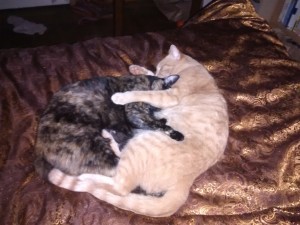A new housemate is moving into Evermore, which is my intentional community here in California. I have to admit, I’ve lost track of how many people have lived here over the years. At least a dozen. People have come and gone for a number of reasons. Some came for a limited period of time, while they were finishing school or sorting out a relationship. Others came indefinitely but left because it became clear that our ideas of communal living were incompatible.

When it comes to our living spaces, the emotions attached to our needs can be overwhelming. Often we re-live childhood memories or issues with our parents, consciously or unconsciously. Deeply held fears surface and we no longer feel safe around our housemates. We feel vulnerable and the things others say and do become minefields of triggers. I know I have been there, I still go there, and I will go there again. It seems like there is no surer way to conjure opportunities for shadow work than living in intentional community.
Whenever community members have needs that conflict with each other, we’re dealing with conflict. Housemate A needs the house to be quiet so they can recharge, whereas housemate B needs to host events and have friends over often so they can feel connected. Both feel angry that the other person is getting in the way of their needs. Both begin to feel unsupported and unsafe in their own home. Maybe housemate A is reminded of their loud brother who didn’t respected their privacy growing up. And maybe housemate B feels like they’re living with their strict parents again, who wouldn’t allow them to have friends over.

Whether or not a community has conflicts, isn’t the question. Every community does. It’s taken me a long time to accept it, but the truth is that conflicts are a natural, inevitable part of community living. They will arise whenever humans with different histories, different personalities, and different needs live together. While we can take certain precautions to minimize conflict, we cannot – in fact, we should not – try to avoid it altogether. Conflict allows us to know one another more fully, to grow in compassion, to learn more about ourselves, and to expand our social skills. What matters most, is how we manage our conflicts.
At Evermore, our first step is direct dialogue between the individuals who are in conflict. Sometimes all it takes is for the two or three community members to share a meal and talk, or to retreat to the ritual room together with a cup of hot chocolate. If direct dialogue doesn’t resolve a conflict, we seek a mediated conversation with another housemate (or an outside mediator, if necessary). Sometimes we need someone whose emotions aren’t running high to help each other feel heard and to understand where the other person is coming from. Most of our conflicts are resolved in this way, we find compromises that allow us to continue living together, and our relationships deepen.

Every once in awhile, however, the needs of one housemate become irreconcilable with the rest of the community. No matter how much as we struggle and compromise, we simply cannot make it work. Even though it hurts, it becomes clear that we need to part ways. Thankfully there has been only one situation in which we needed to kick someone out, in a dramatic confrontation with a psychic vampire (a story I wrote about here).
How we part ways becomes the next challenge. By the time we realize that a situation is irreconcilable, most of us will feel hurt, angry and disappointed that it has come to this. It becomes a struggle to be guided by compassion and wisdom, instead of anger and resentment. I know I’ve made painful mistakes, especially in the very early days of our community. I either didn’t honor my boundaries and agreed to things I quickly regretted, or became desperate and communicated my boundaries and needs without compassion.
What I have learned from my mistakes, is the value of mentors from outside of my community. Ever since that first conflict several years ago, I’ve consulted wise friends and teachers before a housemate parting. They’ve been there for me whenever I’ve gotten stuck. It’s all too easy to get trapped in old stories about myself, to feel victimized, to blame everything on the other person. At the same time it’s also easy to ignore my own boundaries in order to “keep the peace”. Mentors have been a lifesaver, helping me focus on my boundaries while holding on to compassion.

I hate it when the only choices that uphold my boundaries also result is the loss of a community member. Even when we are hurt and angry with each other, I do not want a departing housemate to face hardship. Since housing is scarce around here, it puts the one leaving in a predicament. It is much easier for the community to find a new housemate than for one person to find a new home. In other words, the consequences of us telling someone to leave are much greater than them telling us that they are leaving. It puts us into a position of power and we bear the responsibility of using that power wisely and compassionately.
There are some ways my community has tried to ease the situation for the departing housemate, by giving them extra time to move out (beyond our initial agreements) and by offering financial assistance in the form of loans, rent forgiveness, and donations. Sometimes the move proved difficult nonetheless, other times it led to exciting new opportunities for the person who departed.
Thankfully conflicts that result in someone leaving are rare. There have been a couple of partings that resulted in broken friendships, but others have been handled with integrity and mutual respect. And as a community, we always come away having learned valuable lessons. We become better at voicing grievances early, we learn to communicate more clearly, and we understand our boundaries and our community more deeply.

Although I’ve read books on communication and community living, I still feel like I’m just starting to figure it out. Every new person feels like another wild card in the dangerous and exciting experiment of living life together. I’m adding tools for conflict management to my skillset. I’m learning to anticipate conflict and I shy away from it less often. I’m appreciating just how broken and beautiful we all are, with our difficult histories, diverse personalities, different expectations, and surprising needs. Community can be so messy, but to me, it is a beautiful mess.
This is the first time I have written about conflict in community. It’s a touchy subject and it is challenging to tell the stories of a community without talking about individual members. But conflict isn’t the worst aspect of community living. It is hard, yes, but it can lead us into growth and depth. In my next piece, I will write about what I consider the hardest part, followed by how I use magic to deal with it, and will conclude with a piece on the absolute best thing that has ever happened to me, thanks to living in intentional community.
Until then, I’d love to hear from you. How do you deal with conflict? What are some ways in which you have seen conflict turned into positive change?














